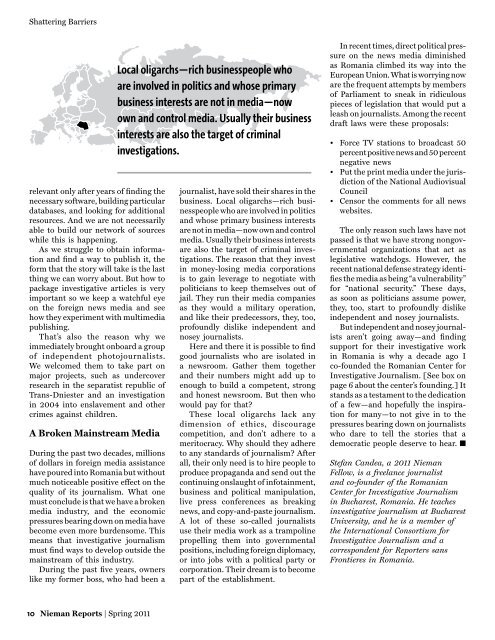N ieman Reports - Nieman Foundation - Harvard University
N ieman Reports - Nieman Foundation - Harvard University
N ieman Reports - Nieman Foundation - Harvard University
You also want an ePaper? Increase the reach of your titles
YUMPU automatically turns print PDFs into web optimized ePapers that Google loves.
Shattering Barriers<br />
relevant only after years of finding the<br />
necessary software, building particular<br />
databases, and looking for additional<br />
resources. And we are not necessarily<br />
able to build our network of sources<br />
while this is happening.<br />
As we struggle to obtain information<br />
and find a way to publish it, the<br />
form that the story will take is the last<br />
thing we can worry about. But how to<br />
package investigative articles is very<br />
important so we keep a watchful eye<br />
on the foreign news media and see<br />
how they experiment with multimedia<br />
publishing.<br />
That’s also the reason why we<br />
immediately brought onboard a group<br />
of independent photojournalists.<br />
We welcomed them to take part on<br />
major projects, such as undercover<br />
research in the separatist republic of<br />
Trans-Dniester and an investigation<br />
in 2004 into enslavement and other<br />
crimes against children.<br />
A Broken Mainstream Media<br />
During the past two decades, millions<br />
of dollars in foreign media assistance<br />
have poured into Romania but without<br />
much noticeable positive effect on the<br />
quality of its journalism. What one<br />
must conclude is that we have a broken<br />
media industry, and the economic<br />
pressures bearing down on media have<br />
become even more burdensome. This<br />
means that investigative journalism<br />
must find ways to develop outside the<br />
mainstream of this industry.<br />
During the past five years, owners<br />
like my former boss, who had been a<br />
Local oligarchs—rich businesspeople who<br />
are involved in politics and whose primary<br />
business interests are not in media—now<br />
own and control media. Usually their business<br />
interests are also the target of criminal<br />
investigations.<br />
journalist, have sold their shares in the<br />
business. Local oligarchs—rich businesspeople<br />
who are involved in politics<br />
and whose primary business interests<br />
are not in media—now own and control<br />
media. Usually their business interests<br />
are also the target of criminal investigations.<br />
The reason that they invest<br />
in money-losing media corporations<br />
is to gain leverage to negotiate with<br />
politicians to keep themselves out of<br />
jail. They run their media companies<br />
as they would a military operation,<br />
and like their predecessors, they, too,<br />
profoundly dislike independent and<br />
nosey journalists.<br />
Here and there it is possible to find<br />
good journalists who are isolated in<br />
a newsroom. Gather them together<br />
and their numbers might add up to<br />
enough to build a competent, strong<br />
and honest newsroom. But then who<br />
would pay for that?<br />
These local oligarchs lack any<br />
dimension of ethics, discourage<br />
competition, and don’t adhere to a<br />
meritocracy. Why should they adhere<br />
to any standards of journalism? After<br />
all, their only need is to hire people to<br />
produce propaganda and send out the<br />
continuing onslaught of infotainment,<br />
business and political manipulation,<br />
live press conferences as breaking<br />
news, and copy-and-paste journalism.<br />
A lot of these so-called journalists<br />
use their media work as a trampoline<br />
propelling them into governmental<br />
positions, including foreign diplomacy,<br />
or into jobs with a political party or<br />
corporation. Their dream is to become<br />
part of the establishment.<br />
In recent times, direct political pressure<br />
on the news media diminished<br />
as Romania climbed its way into the<br />
European Union. What is worrying now<br />
are the frequent attempts by members<br />
of Parliament to sneak in ridiculous<br />
pieces of legislation that would put a<br />
leash on journalists. Among the recent<br />
draft laws were these proposals:<br />
• Force TV stations to broadcast 50<br />
percent positive news and 50 percent<br />
negative news<br />
• Put the print media under the jurisdiction<br />
of the National Audiovisual<br />
Council<br />
• Censor the comments for all news<br />
websites.<br />
The only reason such laws have not<br />
passed is that we have strong nongovernmental<br />
organizations that act as<br />
legislative watchdogs. However, the<br />
recent national defense strategy identifies<br />
the media as being “a vulnerability”<br />
for “national security.” These days,<br />
as soon as politicians assume power,<br />
they, too, start to profoundly dislike<br />
independent and nosey journalists.<br />
But independent and nosey journalists<br />
aren’t going away—and finding<br />
support for their investigative work<br />
in Romania is why a decade ago I<br />
co-founded the Romanian Center for<br />
Investigative Journalism. [See box on<br />
page 6 about the center’s founding.] It<br />
stands as a testament to the dedication<br />
of a few—and hopefully the inspiration<br />
for many—to not give in to the<br />
pressures bearing down on journalists<br />
who dare to tell the stories that a<br />
democratic people deserve to hear. <br />
Stefan Candea, a 2011 N<strong>ieman</strong><br />
Fellow, is a freelance journalist<br />
and co-founder of the Romanian<br />
Center for Investigative Journalism<br />
in Bucharest, Romania. He teaches<br />
investigative journalism at Bucharest<br />
<strong>University</strong>, and he is a member of<br />
the International Consortium for<br />
Investigative Journalism and a<br />
correspondent for Reporters sans<br />
Frontieres in Romania.<br />
10 N<strong>ieman</strong> <strong>Reports</strong> | Spring 2011

















